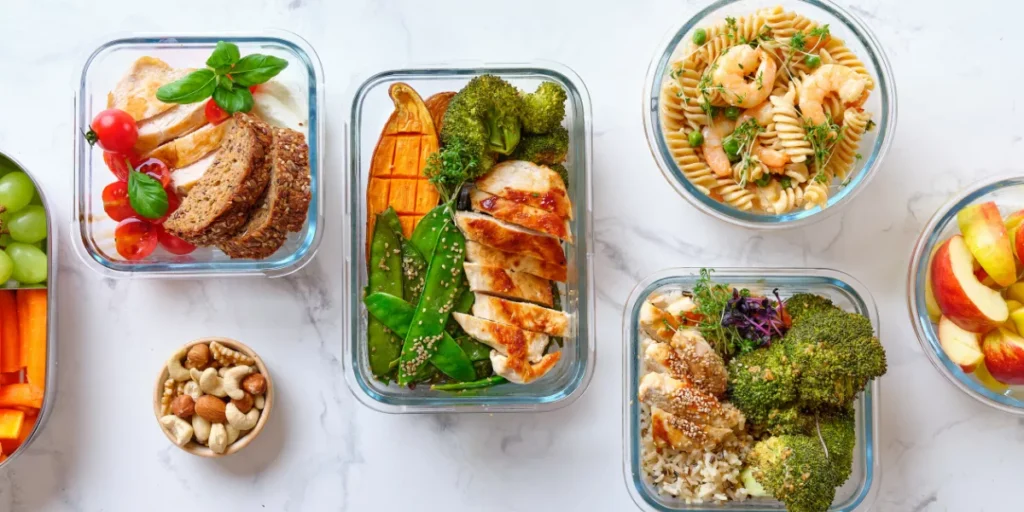Blog
Meal Prepping Tips for Beginners

When starting your meal prepping journey as a beginner, the key lies in mastering the basics. Ensuring you have the right tools and a solid plan in place can set you up for success in the long run. But what about the little details that can make a big difference? Stay tuned to uncover those often overlooked tips that can elevate your meal prepping game and make the process even more efficient and enjoyable.
Benefits of Meal Prepping
By meal prepping, you can save time, money, and stress throughout your week. Imagine coming home after a long day at work, knowing that dinner is already prepared and waiting in the fridge. No more last-minute grocery store runs or expensive takeout orders.
With meal prepping, you have the convenience of simply reheating a nutritious meal and enjoying it within minutes. This not only saves you precious time but also helps you stick to your budget by avoiding impulse food purchases.
Planning and preparing your meals in advance can also reduce stress levels. Instead of worrying about what to cook each day or succumbing to unhealthy fast food options, you can relax knowing that your meals are ready to go.
Essential Kitchen Tools
To effectively meal prep, having the right essential kitchen tools is crucial for streamlining your preparation process and ensuring efficiency in your cooking routine. Start by investing in quality knives for chopping vegetables, meats, and fruits with ease. A cutting board is essential to protect your countertops and provide a stable surface for cutting.
Mixing bowls in various sizes are handy for marinating ingredients, mixing salads, or storing prepped items. A set of measuring cups and spoons will help you portion out ingredients accurately for balanced meals. A good set of pots and pans, along with baking sheets, allows you to cook a variety of dishes simultaneously.
A slow cooker or instant pot can be a game-changer for preparing meals ahead of time. Lastly, storage containers in different sizes are essential for storing prepped ingredients and meals in the fridge or freezer. With these essential kitchen tools, you’ll be well-equipped to tackle your meal prepping journey efficiently.
Simple Meal Prep Ideas
For beginners looking to simplify their meal prep routine, consider these straightforward meal prep ideas to kickstart your journey towards efficient and nutritious eating habits. Start by preparing a big batch of whole grains like quinoa or brown rice to use as a base for various meals throughout the week. Chop up a variety of your favorite vegetables such as bell peppers, cucumbers, and carrots to have them ready for quick salads or stir-fries.
Another simple idea is to cook a large portion of protein like chicken breasts, tofu, or beans that can be used in salads, wraps, or bowls. Hard-boil a batch of eggs for a convenient snack or easy addition to salads. Pre-portion nuts, seeds, and fruits for quick grab-and-go snacks to keep you fueled throughout the day.
Consider making a large pot of soup or stew that can be portioned out for lunches or dinners during the week. Finally, don’t forget to wash and prep your leafy greens like spinach or kale to make assembling salads a breeze. By incorporating these easy meal prep ideas into your routine, you’ll save time and effort while nourishing your body with healthy, homemade meals.
How to Plan Your Meals
Planning your meals effectively is key to successful meal prepping and maintaining a nutritious diet. Start by considering your dietary goals and preferences. Choose recipes that align with your nutritional needs and make a list of ingredients to ensure you have everything on hand. Take into account your schedule for the week to determine how many meals you need to prep.
When planning, think about incorporating a variety of foods to ensure you get a good balance of nutrients. Include lean proteins, whole grains, fruits, and vegetables to create well-rounded meals. It’s also helpful to plan for leftovers or make larger batches that can be frozen for future meals.
Consider utilizing theme nights to simplify your planning process. For example, designate a day for pasta dishes, another for stir-fries, and so on. This can streamline your grocery shopping and meal prep by allowing you to reuse ingredients throughout the week. Finally, don’t forget to account for snacks and beverages in your meal plan to help you stay on track with your nutritional goals.
Tips for Storing Prepped Meals
How can you ensure that your prepped meals stay fresh and flavorful for an extended period of time? Proper storage is key to maintaining the quality of your prepped meals. Invest in airtight containers to store your meals in the refrigerator or freezer. These containers help prevent air from getting in, which can cause food to spoil faster. When storing meals in the fridge, make sure they’re cooled to room temperature before sealing the containers. This helps prevent condensation, which can make your meals soggy. Labeling your containers with the date you prepped the meal can help you keep track of freshness and ensure you consume them before they go bad.
Consider portioning your meals into individual servings before storing them. This makes it easier to grab a meal on the go and reduces the risk of food spoilage when constantly opening and closing containers. When freezing meals, use freezer-safe containers to maintain the quality of the food. Remember to thaw frozen meals in the refrigerator overnight before reheating to preserve taste and texture. By following these storage tips, you can enjoy delicious prepped meals throughout the week.
Diet & Sports Nutrition









